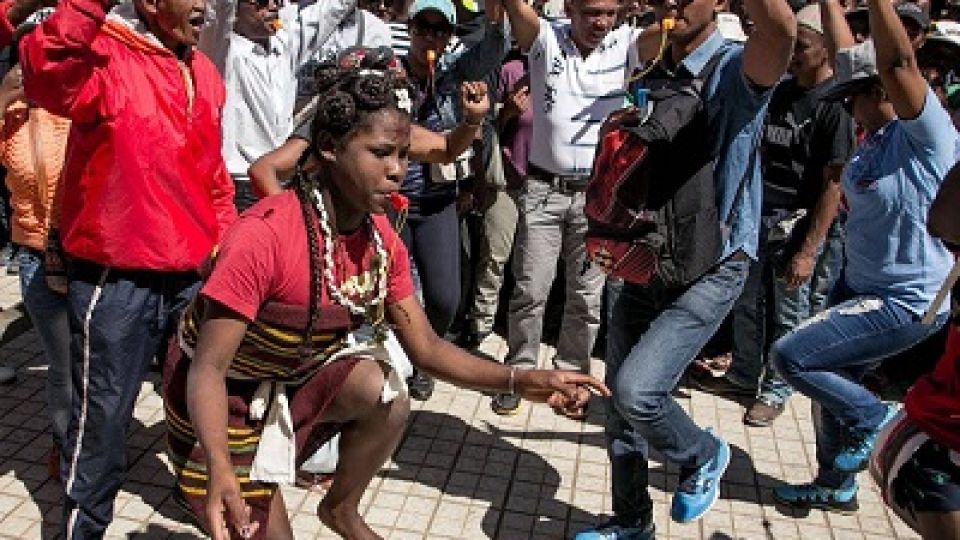from MARIO RAJOMAZANDRY in Antananarivo, Madagascar
Madagascar Bureau
ANTANANARIVO, (CAJ News) – PROTESTS by the opposition and a crackdown by authorities have cast doubts on Madagascar holding credible polls on Thursday.
Demonstrations are commonplace in the capital, Antananarivo, mainly over the participation of Andry Rajoelina (49), who has been president since 2019.
Critics say this is in defiance of an agreement mediated by the African Union (AU) and the United Nations (UN) that he does not take part in the upcoming poll.
In June, it was discovered that Rajoelina (49) had acquired French nationality, thus further compromising his candidature.
Rajoelina’s term will also be remembered for a fallout with the World Health Organisation (WHO) after he slammed the agency for not endorsing the country’s COVID-19 “herbal cure” in 2020.
The media entrepreneur, who leads the Young Malagasies Determined party, is one of 13 contestants including ex-presidents, Marc Ravalomanana (2002 to 2009) and Hery Rajaonarimampianina (2014 to 2018).
The presidential poll was initially scheduled for November 9 but because of unrest, it was moved to this Thursday.
But the tensions remain high and indications are that there would be no postponement.
Despite a ban on outdoor rallies, protests have been regularly occurring since early October, leading to clashes with security forces across the capital, especially along the Avenue de l’Independance and the Place du 13 Mai.
Police have maintained a heavy presence in Antananarivo and have repelled protesters with teargas and water cannons, even briefly imposing a city-wide curfew on October 7. It was lifted the same day.
In October, Rajoelina suffered an injury to the face from a part of an exploded tear gas canister, prompting him to postpone the election to the new date.
The same month, Ravalomanana suffered a leg injury after police fired teargas during an opposition rally.
The latest round of violence occurred last Saturday when protesters attempted to erect barricades on the plaza and the areas of Andravoahangy and Behoririka.
Several people were injured and 11 protesters were reportedly arrested.
Security experts forecast further clashes are likely nationwide on the eve of the elections, especially in Antananarivo.
“Authorities will likely deploy heightened security along key thoroughfares and near government buildings throughout the campaign period and in the days following the election,” said a security analyst.
Officials were likely to impose additional restrictive measures, such as temporary curfews, internet shutdowns, or entry and exit restrictions, to deter violence or in the event of significant unrest.
A French colony until 1960, Madagascar has endured unstable governments, uprisings and disputed elections.
The poll in 2018 failed to produce an outright winner. Rajoelina defeated Ravalomanana in the second round.
Some 5,37 million Malagasy voted, which is 53 percent turnout.
Besides the political problems, the economy in the world’s second-largest island country (after Indonesia) is also troubled.
Growth has decelerated and inflation remains high. Growth is expected to stabilise at 4 percent and average annual inflation to exceed 10 percent in 2023, according to the International Monetary Fund (IMF).
The growth slowdown and losses at state-owned electric utility and water services company, JIRAMA, are weighing on the fiscal balance. The slowdown in vanilla exports has affected forex inflows, putting pressure on the exchange rate.
“Madagascar continues to face a challenging environment, with multiple climate shocks, slower growth, and strong inflationary pressures, burdening the most vulnerable segments of the population (30,5 million),” Antoinette Sayeh, IMF Deputy Managing Director, added.
The official was speaking at the recent conclusion of the International Monetary Fund (IMF) board’s fourth review under the Extended Credit Facility arrangement.
On Sunday, Godfrey Miyanda, former Vice President of Zambia and Head of the Southern African Development Community Electoral Observation Mission (SEOM) officially launched the mission in Antananarivo.
Zambia chairs the SADC Organ on Politics, Defence and Security Cooperation.
SEOM, comprising 55-personnel, has been in the country since November 2.
“We encourage all stakeholders to ensure that these elections are conducted peacefully, freely, fairly, transparently and credibly,” Miyanda said.
– CAJ News

